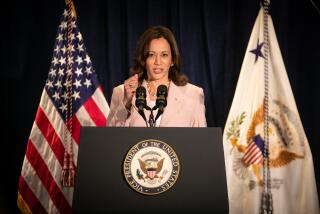Campaign Spending Surpasses $1 Billion
- Share via
WASHINGTON — Spending by presidential and congressional candidates and the national party committees that support them has topped $1 billion for the 2004 election cycle, with more than two months of campaigning to go.
President Bush devoted $209 million to his reelection effort through July, according to a campaign finance report he filed Friday with the Federal Election Commission.
His Democratic rival, Sen. John F. Kerry of Massachusetts, spent $187.8 million through July, according to a report released Friday night.
Senate and House candidates spent $487 million from January 2003 through June, and national party committees burned through more than $400 million, their reports covering the 18-month period show.
Bush took in a record $242 million from the official start of his campaign in May 2003 through last month. He started August with $32.5 million left and about $458,000 in bills to pay. Bush is on pace to break the $250-million mark by the time his primary fundraising concludes with his nomination Sept. 2 at the Republican National Convention in New York.
As Kerry did, Bush is expected to accept $75 million in government financing for his general-election campaign. That means once he is nominated, he can no longer spend private donations on his campaign, though he can continue raising funds for legal and accounting costs.
Kerry’s campaign said he raised $233.5 million through the end of the Democratic convention, including $9 million online during the last two days of the Boston gathering.
Both candidates will benefit from support by their national party committees, which can each spend about $16 million in coordination with their presidential candidate and unlimited amounts independent of him.
Under a law that took effect this election cycle, the biggest contribution the party can collect is $25,000 from an individual. Corporate and union contributions are banned. Individuals can give up to $2,000 to a presidential or congressional candidate.
Nonparty groups that can still collect soft money are spending tens of millions on ads and get-out-the-vote efforts.
More to Read
Get the L.A. Times Politics newsletter
Deeply reported insights into legislation, politics and policy from Sacramento, Washington and beyond. In your inbox twice per week.
You may occasionally receive promotional content from the Los Angeles Times.









